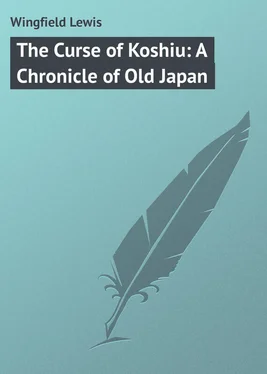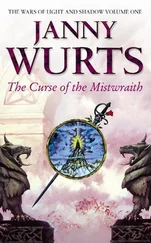Lewis Wingfield - The Curse of Koshiu - A Chronicle of Old Japan
Здесь есть возможность читать онлайн «Lewis Wingfield - The Curse of Koshiu - A Chronicle of Old Japan» — ознакомительный отрывок электронной книги совершенно бесплатно, а после прочтения отрывка купить полную версию. В некоторых случаях можно слушать аудио, скачать через торрент в формате fb2 и присутствует краткое содержание. Жанр: foreign_prose, на английском языке. Описание произведения, (предисловие) а так же отзывы посетителей доступны на портале библиотеки ЛибКат.
- Название:The Curse of Koshiu: A Chronicle of Old Japan
- Автор:
- Жанр:
- Год:неизвестен
- ISBN:нет данных
- Рейтинг книги:3 / 5. Голосов: 1
-
Избранное:Добавить в избранное
- Отзывы:
-
Ваша оценка:
- 60
- 1
- 2
- 3
- 4
- 5
The Curse of Koshiu: A Chronicle of Old Japan: краткое содержание, описание и аннотация
Предлагаем к чтению аннотацию, описание, краткое содержание или предисловие (зависит от того, что написал сам автор книги «The Curse of Koshiu: A Chronicle of Old Japan»). Если вы не нашли необходимую информацию о книге — напишите в комментариях, мы постараемся отыскать её.
The Curse of Koshiu: A Chronicle of Old Japan — читать онлайн ознакомительный отрывок
Ниже представлен текст книги, разбитый по страницам. Система сохранения места последней прочитанной страницы, позволяет с удобством читать онлайн бесплатно книгу «The Curse of Koshiu: A Chronicle of Old Japan», без необходимости каждый раз заново искать на чём Вы остановились. Поставьте закладку, и сможете в любой момент перейти на страницу, на которой закончили чтение.
Интервал:
Закладка:
"Did O'Tei know even how to hold a lance?" sneered No-Kami.
Of course she did, she replied, with a forced smile. Was not every noble damsel taught how to defend her home?
At the outset she had made a mistake by showing her thoughts upon her features, an error that might be yet retrieved. To smooth the disappointed furrows from his wrinkled brow, she took the lance from him, and straightway went through the exercise. For a moment it pleased his vanity to watch the graceful movements of her tall lithe form as, gathering in one hand the ample folds of her long robe, she ran forward, thrust, and recovered. And then, happening to glance at the tell-tale countenance, he cursed and ground his teeth, for her martial exercise was a sham.
Her thoughts were far away. Like a patient automaton wound up with a spring, she half consciously did what was required, but clearly found no pleasure in the act. With a great oath he roughly wrenched the weapon from her, and bade her go mind her distaff.
She sighed, and, obeying with aggravating meekness, retired to her chamber; and from this moment there grew up between the wedded pair a thicket which waxed stronger each day and thicker. The parasites-braggart samurai, turbulent officers and soldiers, and truculent hangers-on-were quick to perceive a change with which they sympathised, and prompt to act upon it. Boisterous, rude, ill-mannered at the best, they saw that, like themselves, their lord was ashamed of his handsome and cold but fragile wife, and by insensible gradations-he unwitting of it-their perfunctory respect dropped from them. No-Kami was heard one day, in unguarded whirl of wrath, due to baulked hope and disappointment, to dub her "Puling baby-face," and loud was the laughter at the sobriquet , for one and all they unconsciously chafed under a refinement of which they had no experience, and came to hate her for her gentleness.
And so it came about that, abandoning as hopeless at the initial stage the mission for which (by the late statesman's cunning) she had been destined, O'Tei withdrew from serious attempts at influencing the despot, and made the first fatal downward step on her dark and stony road.
Entrenching herself behind a screen of pride, she withdrew herself from contact with the samurai, by whom she was treated with a surly carelessness that was insult but half concealed. When etiquette required it, she appeared in public beside No-Kami, whose attitude was sulky and displeased; at other times she abode in her own bower overlooking the swift river, a retreat where she could not hear the yells and sword-thuds, embroidering among her maidens, or reading poetry, or playing on the three-stringed samisen. Though secluded, it was by her own choice, and she in no sense a prisoner. No-Kami, when in amiable mood-which, as time went on, became a more and more unusual circumstance-displayed for his wife an uncouth, sulky, snarling respect, like that of a wolf under a whip; for instinct whispered that he was totally unworthy, – that as she came to read him better she would despise him more, – that already she saw with those calm clear eyes his many faults and mental smallness, though too well-mannered and too haughty to admit it. A rude and proud as well as licentious and undisciplined man finds contempt from her who should be his congenial helpmeet a constantly galling spur.
If O'Tei, descending from that lofty pedestal, would only have abused him roundly, – have bandied sharp words, – have stooped to scold him, he would have breathed more freely. The air would have been cleared of its oppressiveness, for he would have known himself nearer to her level. How exasperating was it to the self-indulgent and unscrupulous tyrant to have this pale and silent and superior woman always at his elbow dispassionately contemplating his peccadilloes with disapproval peeping from her eyes. The worst of it was that he knew her to be right in her estimate of him, and secretly admired his chill and independent wife. Yet at the same time her presence was irksome, and goaded her spouse to flashes of rage which drove him, as it were in protest, to deeds of violence. It was the old story, which is ever new, of the 'little rift;' of two young lives starting side by side from standpoints far as the poles, with mutual misunderstanding and distrust, that increase like a rolling snowball till they grow into active detestation.
The Hojo neglected and avoided his consort, but was not wilfully cruel. If he chanced to have it by him, he would, when asked, give her money for charities; for, like many another misunderstood lady, she sought a salve for lacerated feelings in good works. It would have been most impolitic to have been patently unkind to her, because it was not well to make a foe of Nara by openly ill-using his heiress. He wist not of the conduct of the samurai, who took their cue from him; but he certainly saw as little as he conveniently could of his beautiful better half, spending considerable time at Kiŷoto quarrelling with other daimios, browbeating his imperial lord.
For her part, reared in retirement, and a stranger to town gaieties, she preferred the castle-when No-Kami was absent with his scowling retinue. Then, her own mistress, she would order her kago, – a heavy gorgeous litter, gold lacquered and emblazoned, adorned with rich curtains, and cushions, and tassels, borne on the shoulders of twelve staggering men-and penetrating, when the fancy seized her, along the centipede street of Tsu, make for a garden beyond, to which she had taken a liking. Reaching the favoured spot was the difficulty, for it was necessary to pass along two miles and more of straggling street and suburb, where poverty, if speechless, was rampant. To her pale face, though, it always showed its less hideous side, for the poor of Tsu (how many there were of them!) soon learned to adore their chatelaine.
She could not with her feeble force even attempt to stem the tide of suffering due to my lord's oppression; but the crushed creatures knew right well that behind the marble mask was a deep fund of pity-that their lady would sometimes go dinnerless herself for the sake of starving children. When she passed by, the toilworn women would look up, and show their blackened teeth in a wan smile; and the brown naked children, with their comical shaved pates and elf-locks-their bat-ears, wide mouths and eyes à fleur de tête like slits-would come trooping and crowing about her. She was always interested in the details of their poor homes, – ready with soothing words, and such money as she happened to possess; would converse with the old men as they wove sandals, the two straw loops caught on their great toes; criticise the painting of the phœnixes on the umbrellas of oil paper, an industry in vogue in these parts; exhort the languishing men to renewed courage and hope; and all the while her revolted soul died within her at contemplation of the wretched huts of mud and bamboo, some of them mere mats stretched on sticks, and stiffened with wire, with rotten crumbling roofs of decayed rice thatch, and mud floors that were never dry. Her heart bled for the patient, suffering people, and she was glad to get away to her garden, where the sun shone forth with halcyon brightness, and nature at least was happy. For Tsu, I would have you know, is not all ugliness. Passing out of the low-lying oozy suburb, you reach a wooden bridge over one of the numberless streams that intersect the marsh, and a little further on come to rising ground, well wooded with the luxuriant vegetation which in Japan is the lavish gift of the rain-god. At the top of the hill, under the lee of a group of ancient pines, much tossed and wind-beaten, is a summer-house. From the road it is not visible, so deeply is it embowered in cherry and maple, each so glorious and lovely in its season, the which are closely tangled and entwined with such cataracts of purple wisteria as no western mind can realise. This hill or hillock, and another one hard by, stand alone on a wide plain, and from them may be gained a singularly varied view of flat marsh, and sedge, and vivid green rice fields, and scattered villages, and far-off hazy mountains. In front-and this was the view that brought back peace into the empty breast of the young chatelaine, the ground shelved gradually, thick strewn with flowers, until-a semicircle of yellow sand-it was washed by the softly-rippling waves of a blue bay, land-locked. Here nature, casting her golden glamour over all, masked the prevailing squalor. No typhoon ever vexed these enchanted waters, that washed to and fro in slow cadence the clumps of bamboo with which their edge was feathered. The tiny toy villages on the opposite brink were mirrored in long shadow. The festooned sails of the little fishing-boats, and trim white junks, were pictured in quivering double four times their height. The mountains beyond, of a deep reddish purple, without detail in the haze, were topped with strange silhouettes of single pines, clear against opal ether, or sharp cut against the blue with chasm and precipice. Many rocky islets were dotted here and there-volcanic, peaked, flat-topped-each with its long reflection, fringed with feathery foliage, hanging apparently to nothing-around, a flight of boats, like sea-birds floating. Sitting for hours gazing down on the fairy scene, her stalwart naked kago-bearers asleep like statues of warm bronze away in the shade, O'Tei could forget her disillusions; but then with setting sun the shadow darkened, for the time was arrived when she must go home again, and with a return to the panoply of war, and swagger of the sentinels, peace and light faded out, and her heart was as sick as ever. Sometimes, more sad than usual, she would make to the sister hill a pilgrimage.
Читать дальшеИнтервал:
Закладка:
Похожие книги на «The Curse of Koshiu: A Chronicle of Old Japan»
Представляем Вашему вниманию похожие книги на «The Curse of Koshiu: A Chronicle of Old Japan» списком для выбора. Мы отобрали схожую по названию и смыслу литературу в надежде предоставить читателям больше вариантов отыскать новые, интересные, ещё непрочитанные произведения.
Обсуждение, отзывы о книге «The Curse of Koshiu: A Chronicle of Old Japan» и просто собственные мнения читателей. Оставьте ваши комментарии, напишите, что Вы думаете о произведении, его смысле или главных героях. Укажите что конкретно понравилось, а что нет, и почему Вы так считаете.












